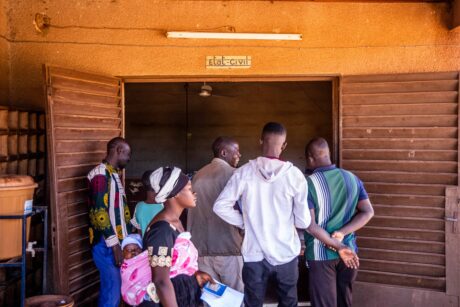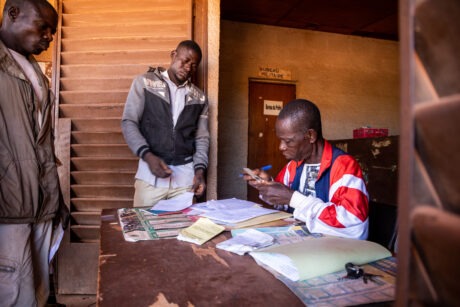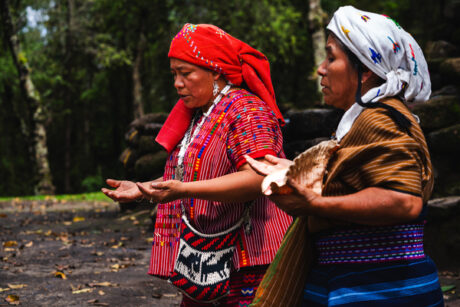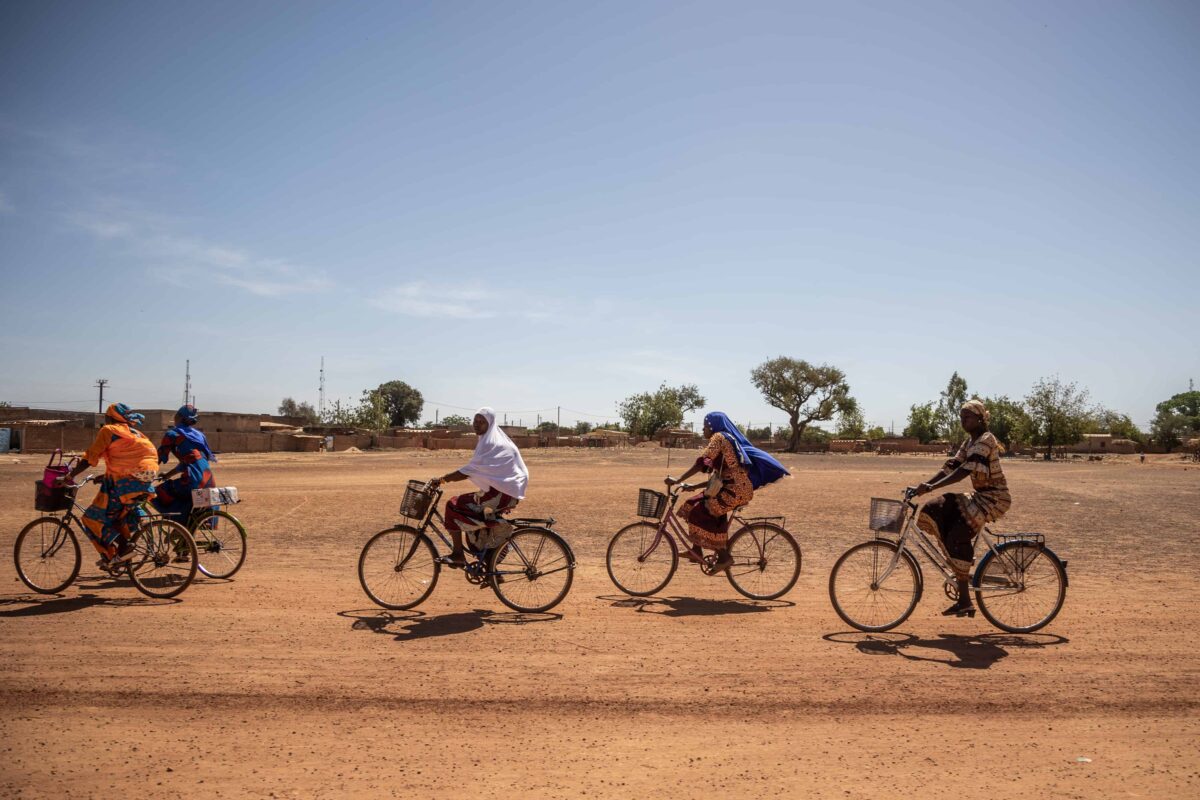Enquanto Burkina Faso enfrenta violência extremista e escassez de alimentos e água, quando as comunidades precisam se unir em busca de soluções urgentes, os cidadãos sentiram-se desligados do seu governo.
As comunidades no Burkina Faso avaliaram a força da sua governação local em 2021, um processo apoiado pela Governança Inclusiva para Resiliência da USAID (RIG) projeto. Concluíram que os projectos que os funcionários apoiaram no orçamento municipal não reflectiam as prioridades dos cidadãos.
“Os líderes locais não são representativos,”, disse um cidadão.
“Os vereadores não fazem o seu trabalho como deveriam. Eles só veem seus interesses,” outro disse.
Três anos depois, comunidades em torno de Burkina Faso estão testemunhando um aumento no envolvimento cívico com o apoio da RIG. Em agosto e setembro 2024, funcionários de quatro comunas aventuraram-se longe das câmaras municipais e organizaram reuniões de base em aldeias rurais e bairros urbanos para solicitar a opinião dos residentes para o próximo orçamento do governo local.
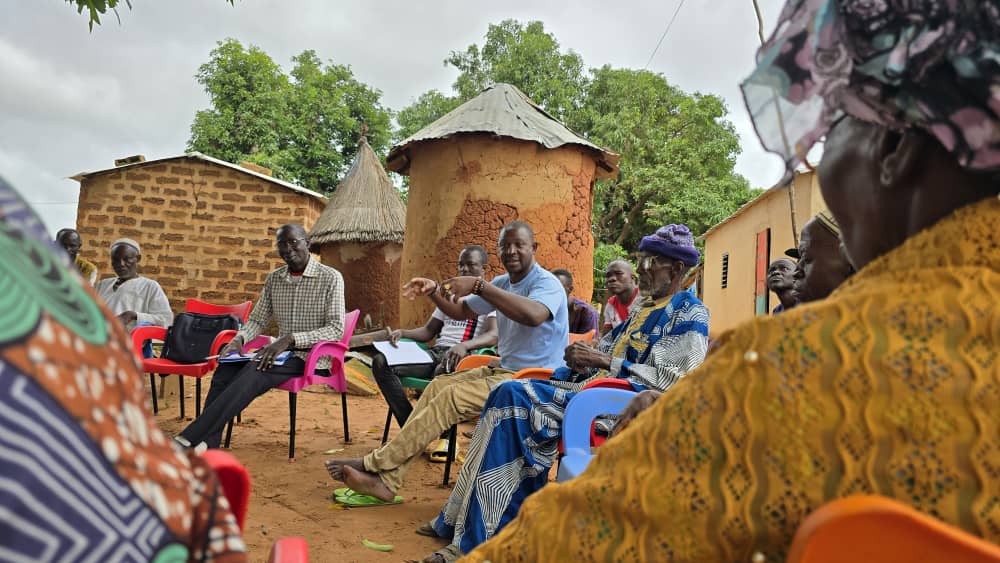
Alasson Soura, um morador da aldeia Niofila, disse estar impressionado com o facto de os funcionários da comuna de Douna terem envolvido os residentes numa discussão significativa que tornou transparente a tomada de decisões do governo.
“Se o orçamento reflectir o que os aldeões expressaram, eles ficarão satisfeitos porque as decisões foram tomadas na frente deles, e todos deram sua opinião,”Sura disse.
Avaliando os pontos fortes e fracos do governo local
O IGR reuniu partes interessadas da comunidade para workshops em 2023 avaliar os pontos fortes e fracos da governação local. Na comuna rural de Guibaré, no norte de Burkina Faso, membros da comunidade concluíram que embora o pessoal financeiro municipal fosse competente, o governo comunicou pouco sobre o processo de formulação do orçamento local. As trocas de informações entre as autarquias locais e os cidadãos não foram formalizadas. Como resultado, os cidadãos sabiam pouco sobre o processo e foram excluídos da tomada de decisões.
As autoridades locais concordaram que o caminho para uma governação mais forte exigia tornar os seus processos mais transparentes e demonstrar que o governo é responsável perante a população, envolvendo mais os cidadãos.
Para apoiar as autoridades locais no aumento da transparência, responsabilização e compreensão mútua com os cidadãos, IGR organizou sessões de formação em Abril e Dezembro 2023 para 102 funcionários envolvidos no processo orçamentário em seis regiões — Cascades, Centro Norte, Leste , Hauts-Bacias, Norte e Sahel. Durante o treinamento, os funcionários aprenderam que envolver os cidadãos na elaboração do orçamento aumenta a sua confiança e satisfação no governo, tornando-os mais dispostos a pagar impostos. Além disso, a participação dos cidadãos proporciona aos funcionários informações valiosas que tornam o orçamento mais rentável.
Os funcionários também aprenderam como estruturar a participação dos cidadãos, garantindo ao mesmo tempo a inclusão das mulheres, juventude, pessoas com deficiência e pessoas deslocadas internamente (Deslocados internos).
Durante workshops de cocriação facilitados pelo IGR, as autoridades locais endossaram roteiros que descrevem as medidas que irão tomar para aumentar a participação pública na governação. Em Guibaré, responsáveis comprometeram-se a melhorar a compreensão do público sobre o processo orçamental através do orçamento participativo até ao final de 2025 ao mesmo tempo que aumenta o envolvimento dos cidadãos na prestação de serviços públicos de qualidade pelo governo.

Em agosto 2023, A Delegação Especial ou Câmara Municipal de Guibaré aprovou por unanimidade uma resolução declarando que a comuna adoptaria um processo participativo para orçamentos futuros. “A governação local requer o envolvimento de todas as partes interessadas da comunidade,”a resolução afirma. “Para fazer isso, é importante, mesmo necessário, adotar uma abordagem na qual o processo de planejamento, a implementação e a monitorização do orçamento colocarão os cidadãos no centro.”
“A vontade de permitir uma melhor compreensão da população levou-nos a adoptar esta abordagem para que todos se sintam envolvidos e tenham confiança na gestão da Delegação Especial,disse Rasmané Ouedraogo, Secretário Geral da Câmara Municipal de Guibaré.
“O processo de orçamento participativo é muito benéfico para o município e para a comunidade. Quando os membros da comunidade são informados, eles se envolvem em todas as atividades de desenvolvimento da comunidade.”
Apoiando o início da participação
No entanto, o orçamento participativo apresenta os seus próprios desafios financeiros. As câmaras locais não tinham fundos para organizar passeios pela comuna e realizar assembleias gerais de residentes. Os fundos estão particularmente escassos recentemente, uma vez que a insegurança no país prejudicou a economia, reduzindo a receita do governo.
Apoiar o interesse dos municípios na implementação do orçamento participativo, em 2024, A RIG forneceu subsídios a quatro comunas para ajudar a organizar sessões de orçamento participativo. Se a participação reforçada dos cidadãos levar ao aumento da arrecadação de impostos, os municípios seriam capazes de cobrir os custos da divulgação no futuro.
Outra comuna que se junta ao movimento em direção à democracia participativa é Douna, na região de Cascades, ao sul.. Durante a autoavaliação facilitada pelo IGR, os membros da comunidade concluíram que o governo local reconhece as necessidades dos grupos vulneráveis e está aberto a parcerias com a sociedade civil. No entanto, o governo não divulgou o seu processo de formulação do orçamento municipal e não tinha nenhum sistema formal para recolher preocupações públicas. Como resultado, os cidadãos participaram pouco na identificação de prioridades.
Funcionários da comuna de Douna endossaram um roteiro para fortalecer a participação cívica. Com a ajuda do IGR, eles elaboraram um plano para organizar “dias de prestação de contas” anuais com assembleias gerais nas aldeias da comuna. O plano também prevê campanhas dirigidas ao público em geral sobre a importância do envolvimento cívico e dirigidas aos homens sobre a importância do envolvimento das mulheres na governação.. A sua subvenção IGR irá formar membros do conselho e funcionários municipais no desenvolvimento de parcerias para o envolvimento dos cidadãos e organizações da sociedade civil para participarem em processos públicos.
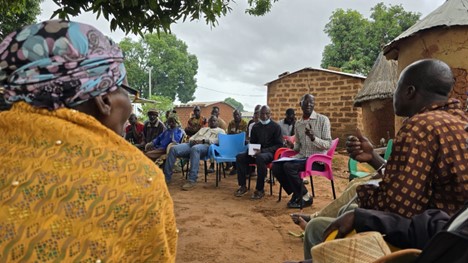
Em Douna, o conselho municipal nomeou alguns dos seus membros para uma comissão encarregada de iniciar o orçamento participativo. Eles organizaram reuniões de base em toda a comuna para questionar as necessidades e expectativas dos residentes relativamente ao próximo orçamento da comuna.. Em agosto 2024, os membros do comité reuniram-se com membros da comunidade nas aldeias da comuna e com grupos específicos, incluindo jovens, mulheres, pessoas com deficiência e deslocados internos, para garantir que suas preocupações fossem consideradas no orçamento.
Soura da aldeia Niofila ficou impressionado com as visitas. “É a primeira vez que vejo a delegação especial da prefeitura sair pelas aldeias para ouvir as necessidades das pessoas antes de elaborar o orçamento,”Soura disse. “Isto motivará as pessoas a participarem mais nestes encontros e promoverá a inclusão e a coesão social. Se as coisas tivessem sido feitas assim no passado, estaríamos em um nível diferente de desenvolvimento hoje.”
Incluindo mulheres, jovens e grupos marginalizados
Funcionários de Douna detidos 15 assembleias de aldeia com a ajuda da IGR. Madiara Soura, presidente da Coordenação de Mulheres Douna, Apreciaram o facto de os funcionários terem dado às mulheres uma plataforma para expressarem as suas opiniões sobre a governação local.
Em setembro 2024, A RIG ajudou três outras comunas a iniciar o orçamento participativo: Fada N’Gourma na Região Leste, Kaya na região Centro-Norte e Ouahigouya na região Norte. Os membros dos conselhos municipais viajaram para as aldeias das suas comunas para conversar e recolher os pontos de vista dos residentes para os informar na elaboração dos seus orçamentos.
Em Ouahigouya, por exemplo, RIG facilitado 35 assembleias gerais com 1,042 participantes. Estas assembleias permitiram aos cidadãos expressar as suas preocupações e identificar prioridades para a comunidade.
Em Kaya, 20 assembleias gerais reunidas 834 participantes. Em Fada N'Gourma, a comuna e o RIG organizaram 12 assembleias gerais que atraíram mais de 1,000 residentes. Os participantes disseram que é urgentemente necessário financiamento para os centros de saúde, escolas e acesso a água potável. Autoridades e residentes discutiram como poderiam mobilizar recursos, incluindo o apoio do sector privado.
Moradores disseram que querem ver mais desse tipo de divulgação, apoiado por uma comunicação mais eficaz para que todas as comunidades estejam cientes da oportunidade de interação. Mas a maioria concordou que as reuniões constituíram um passo significativo em direcção a uma melhor governação.
“Pela primeira vez, a administração está interessada nos jovens e nas suas preocupações,”comentou Moussa Kara, um representante da juventude em Douna.
Haoua Ango e Yacouba Kere contribuíram para este artigo.
